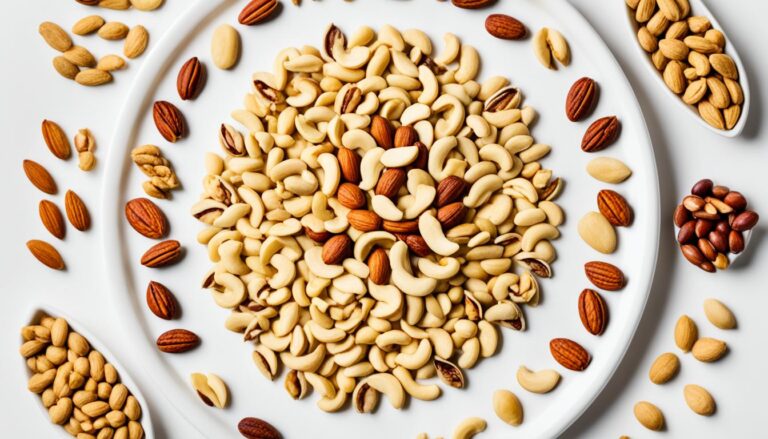Ever wondered why some people easily keep healthy lifestyles while others find it hard? The answer is in habit formation. Habits are automatic actions that shape our days. Learning to create and keep healthy habits can lead to a more vibrant life.
In this guide, we’ll dive into habits, show how to change them, and give a step by step to build lasting healthy habits. Are you ready to start a journey to a healthier happier you?
Key Takeaways
- Habits are the automatic behaviors that shape our daily lives.
- Understanding the nature of habits is the first step towards creating sustainable healthy changes.
- Identifying your current habits and the triggers that drive them is crucial for effective habit transformation.
- Implementing proven strategies, such as starting small and stacking new habits onto old ones, can help you build healthy routines that last.
- Incorporating accountability, self-reflection, and positive self-talk can further support your habit-building journey.
Understand the Nature of Habits
To create healthy habits, we need to understand how they form. Habits are actions we do over and over, becoming automatic. When we do something often in response to a cue, our brain links the cue to the action, making it a habit.
This cycle of cue, routine, and reward is key to habit psychology. The cue starts the habit, the routine is the action, and the reward makes us want to do it again. Whether good or bad, habits shape our lives.
Habits are Automatic Behaviors
Habits are automatic. Once a habit forms, it takes less effort to do it. Our brain creates pathways for these habits making them almost instinctive. Habit psychology shows how these actions become part of our daily lives.
Habits Can Be Good or Bad
Habits greatly affect our health and happiness. Healthy habits like exercise or mindful eating improve our lives. On the other hand, unhealthy habits like too much snacking or sitting can harm us. Knowing the difference is key to bettering our lives.
By understanding the repetitive behaviors and the cue-routine-reward cycle behind them, we can change our habits for the better.

We are what we repeatedly do. Excellence, then, is not an act, but a habit. – Will Durant
Identify Your Current Habits
To start building healthy habits, first, you need to know what you do every day. Look closely at your daily routines and behaviors. Notice the triggers like places, times, or feelings that make you act a certain way. This self-reflection helps you see what habits you want to change and what triggers to tackle.
Observe Your Daily Routines
Start by watching your daily activities and patterns. Pay attention to your behaviors and why you do certain things. Are there times or situations that make you do unhealthy things? By tracking your behavior, you can find out what triggers your habits.
Recognize Habit Triggers
After watching your daily life, find out what cues or environmental factors affect your habits. These could be times of day places, or feelings. Knowing these habit triggers is key to changing bad habits for better ones.

By looking at your habits and what shapes them, you can start making positive changes. This understanding is the first step to creating healthy habits that improve your life.
How do you create a healthy habit?
Creating new habits can be tough but rewarding. Start small and set clear goals. Trying to change everything at once is too much. Begin with one simple, doable action each day.
Start Small and Be Specific
It can take up to 254 days for a new habit to stick. This shows the importance of sticking with it for a long time. Experts say habits take longer than the common 21-day rule to become solid.
Starting with small changes makes it easier to reach your habit formation strategies and behavioral goals. This leads to lasting success.
Make a Plan and Set Reminders
After picking a behavioral goal, make a detailed action plan. Decide when, where, and how you’ll do the new habit. Use reminders like alarms or calendar entries to help remember.
Experts say starting small boosts your chances of success. This is better than trying big changes that need too much motivation.
The S.M.A.R.T. goal-setting method is great for setting and tracking your habits. It helps make your goals clear and achievable. Habit stacking, adding new habits to your current routines, also helps keep habits healthy.
Repetition is key to making a new habit stick according to the Harvard Business Review.
Utilize Existing Routines
Creating new healthy habits doesn’t mean starting over. A smart way is to add them to your daily routines through habit stacking and routine integration. By using your current habits as a base, you can make new ones easier to adopt and keep.
For instance, you can meditate briefly while waiting for your coffee or stretch while brushing your teeth. This method makes adding new habits to your life simpler and boosts their chances of sticking.
Stack New Habits on Old Ones
The secret to successful habit stacking is to find ways to add new habits to your existing routines. Here’s how to do it:
- Watch your daily activities and spot the regular things you do, like your morning routine or evening wind-down.
- Look for chances to add new habits to these routines, such as:
- Meditating while your coffee brews
- Doing exercises while watching the news
- Writing in a gratitude journal before bed
- Begin with a small, specific habit. As it becomes a part of your life, you can make it more frequent or long.
- Use reminders or visual cues to help you remember to do the new habit. This makes it blend smoothly into your routine.
By stacking new habits onto your current ones you make changing your behavior easier. This approach also helps you keep the new habits for the long term.

Eliminate Temptations
Keeping healthy habits isn’t just about willpower. It also means making your environment less tempting. By changing the things around you, you can make it easier to stay on track. This helps you avoid old, unhealthy habits.
Reshape Your Surroundings
Look at your daily routine and find out what’s holding you back. Do you have junk food in the kitchen? Is your workout gear hidden? Make your space support the habits you want. Put healthy snacks where you can see them, and keep your exercise gear out.
Studies show that saying I don’t helps you feel more in control. It makes you more likely to make good choices. On the other hand, saying I can’t makes you feel powerless. By designing your environment wisely, you can make healthy choices easier.
I don’t is perceived as a choice, enhancing feelings of empowerment and willpower, while I can’t is seen as a restriction, draining one’s sense of power and agency.
Waiting a bit before giving in to a bad habit can also help. Just a five minute delay can build self-control. It gives you time to think about choosing the healthier option.

Creating an environment that supports your goals is key to lasting, healthy habits. By removing temptations and changing your surroundings, you can achieve the lifestyle you want.
Involve Others for Support
Building healthy habits is easier with the help of others. Studies show that older adults with close friends live longer. They also have a lower risk of health problems like depression and high blood pressure.
It’s not just about having many friends. The quality of friendships matters more. Joining chat groups or online communities can help make or keep friendships. This can reduce loneliness and improve health.
Personal relationships are key to adopting and keeping healthy habits. This is why social support, accountability partners, and habit-building communities are crucial. Having a supportive community helps reach wellness goals.
Building healthy habits can also strengthen relationships. It’s a way to bond with others. Finding a supportive community can help keep healthy habits and achieve wellness goals.

| Benefits of Social Support | Key Strategies |
|---|---|
|
|
Track Your Progress
Starting new healthy habits is a journey. It’s important to track your progress regularly. This helps keep you moving forward and makes positive changes last.
You can use a journal or a habit-tracking app. Both methods help you see your daily actions and celebrate your wins. This makes a big difference.
Leverage Journals or Apps for Habit Tracking
Writing down your habits and milestones gives you insights. It shows your commitment. You might choose a notebook or a habit-tracking app.
Apps offer features like reminders and streak tracking. They help you see patterns and stay on track. Recording your progress helps you stay accountable.
Celebrate Small Wins Along the Way
It’s important to celebrate small victories. Researchers at Stanford University found that achieving small goals early on greatly increases motivation. Celebrate every small success, like a workout or a healthy meal.
Harvard Business Review reports that repetition is key to making a new habit stick. So, celebrate these small wins to keep you motivated and inspired.
By tracking your habit tracking and progress monitoring regularly, you’ll stay focused. This, along with positive reinforcement and self-reflection, helps you overcome challenges. It makes your healthy habits a lasting part of your life.
Practice Positive Self Talk
The way you talk to yourself matters a lot. Using positive self-talk can help you build and keep healthy habits. It’s a key mindset shift that boosts your self efficacy and motivational strategies.
Studies show that optimists live better lives. Positive self talk helps athletes perform better and overcome obstacles. Even kids can learn to stop negative self-talk showing its importance.
Being around positive people can also change your outlook. Plus, online therapy sites like Talkspace and LARKR offer help from licensed therapists. They can teach you to think more positively.
Positive thinking and optimism are key for managing stress. They lead to many health benefits, such as:
- Longer life
- Less depression
- Stronger immune system
- Better mental and physical health
- Lower risk of heart disease and stroke
Negative self talk, like filtering, personalizing, and catastrophizing, can harm you. But, positive self talk can help you accept yourself more and be less critical.
Your inner voice shapes your mindset and success in healthy habits. Use positive self-talk as a powerful tool for a better life.
Visualize Future Benefits
Looking ahead with future-oriented thinking keeps you motivated, even when things get tough. Picture the good changes you’ll see, like better health, more energy, or stronger bonds. Seeing these benefits ahead helps you resist quick fixes and stick to your goals.
Imagine Long Term Rewards
Research by Sonja Lyubomirsky shows the WOOP method is great for planning for the future. By daydreaming about the perks of healthy living, you boost your drive and toughness.
For instance, a short morning meditation on healthy eating can stop you from buying junk food later. Like Michael Phelps, who used visualization to win, this trick helps you beat hurdles and reach your health targets.
| Visualization Technique | Potential Benefits |
|---|---|
| Spend a few minutes daily visualizing future health improvements |
|
| Imagine achieving your wellness goals, such as managing a chronic condition |
|
By vividly picturing the health and wellness benefits of your habits, you stay driven and avoid quick fixes. Don’t forget to celebrate small wins, like more energy or a better mood. These are signs you’re moving forward.
Need help visualizing and reaching your wellness goals? Call IntuneHealth at 1 844 646-8863. They offer quick appointments and walk-ins for Medicare Advantage plan holders 65+, helping you start your journey to better health.
Be Patient and Persistent
Creating lasting healthy habits takes time and effort. It’s not something you can do overnight. The habit formation timeline varies for everyone, so patience and persistence are key.
Setbacks and challenges are part of the journey. When faced with setbacks and resilience, don’t give up. These moments help you learn and grow. Celebrate your small wins and keep moving forward.
Always look for ways to improve. Reflect on your progress and make changes as needed. Try different approaches until you find what works for you. Remember, every step forward is important, even if progress isn’t always smooth.
The secret of getting ahead is getting started. The secret of getting started is breaking your complex overwhelming tasks into small manageable tasks, and then starting on the first one. – Mark Twain
Building healthy habits is a lifelong journey. Be patient and stay committed. With time and effort, your habits will become a part of your life, improving it in many ways.
| Habit Formation Stage | Typical Timeline | Key Considerations |
|---|---|---|
| Cue | Immediate | Identify your habit triggers and plan accordingly. |
| Craving | 2-3 weeks | Be mindful of your desires and find healthy alternatives. |
| Response | 2-4 months | Consistency is key make your new habit a part of your routine. |
| Reward | 6-12 months | Celebrate your progress and find intrinsic motivation. |
The journey to building healthy habits is not always easy. But with patience and persistence, you can reach your goals.
Conclusion
Building healthy habits can change your life for the better. It boosts your physical, mental, and emotional health. By understanding habits, knowing your current habits, and using effective strategies, you can live a healthier life.
Start with small steps, use what you already do, and be patient. With hard work and kindness to yourself, you can keep up healthy habits. These habits will help you reach your goals and improve your life quality.
This guide on sustainable behavior change shows how to adopt and keep healthy habits. It teaches you to recognize what triggers habits and how to make better choices. By focusing on the big goals and celebrating small wins, you can stay strong and positive on your habit-building journey.
Changing your lifestyle for the better is unique to you. It needs personal touches, knowing yourself, and trying new things. By following this guide, you can start building habits that bring you health, energy, and purpose. Start this journey and discover your full potential for a better, happier you.





